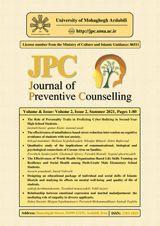فصلنامه مشاوره پیشگیرانه
Journal of preventive Counselling

Journal of Preventive Counselling (JPC) is an international and peer-reviewed journal publishing high-qualified and original research articles in the fields of counselling, psychology, mental health and prevention of psychological problems. JPC is an international, peer-reviewed journal publishing high-qualified and original research articles. Please see the aim and scope of the journal for more information about its focus and peer-review policy.
Please note that only manuscripts in English will be published in this journal.
The Original Articles and Research Reports are accepted for publishing in the Journal of Preventive counselling.
Mostly articles are published in JPC which envisage reports of original research or systematic literature reviews. However, there are several other types of article that we are keen to publish, especially by new or less-experienced writers. We encourage submissions of briefer articles entitled 'In Practice' or 'Debate', which are more reflective pieces, stating opinion and encouraging debate. We also publish 'Literature review essays' which are themed critical reviews linking more than one related publications, illuminating theory or practice in novel ways. Finally, we are interested in ideas for interviews with key figures in the field, or someone who offers a unique perspective. Do not hesitate to contact us if your ideas contribute the objective of the journal. The papers, must, like all submissions, be contextualized in the literature and carry high academic standard and needless to add are peer reviewed.
· (a) Counseling and psychotherapy,
· (b) First, second and third levels of preventive strategies in counseling and clinical psychology,
· (c) Career counseling and career development.
· Preventive models and strategies,
· Diverse theoretical orientations (e.g., psychodynamic, cognitive, behavioral, humanistic, experiential and systems approaches)
· Treatment modalities (e.g., individual, group, couples, and family)
· Research paradigms (e.g., quantitative, qualitative, clinical trials, process studies, outcome prediction, systematic case studies, measure development, and meta-analyses).
کلیه حقوق برای مجموعه سیویلیکا محفوظ است© - مرجع مجلات علمی


